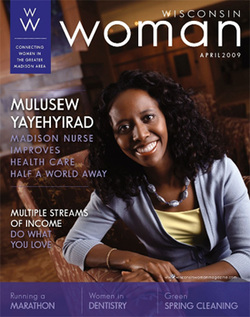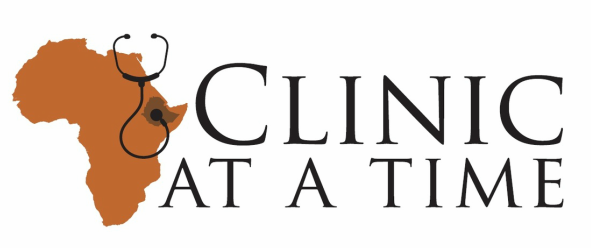
Mulusew Yayehyirad
Madison nurse improves health care half a world away
By Kathryn Kingsbury
When Mulusew Yayehyirad was growing up in Ethiopia, her parents demonstrated an approach to life that continues to motivate her today. "My parents taught me that when you have enough for yourself, don't be greedy," she says.
"Share it with others." As successful business owners in a country where four-fifths of the population earn less than $2 a day, Yayehyirad's parents were quick to share their luck. They took about 15 of their younger siblings, cousins, nieces and nephews into their home and raised them, building extra rooms to house them all. On religious holidays, the Orthodox Christian family would celebrate by cooking huge feasts. But, before sitting down to dinner, they brought most of what they had prepared to the public square where homeless people gather. "Nobody eats at the house until [my parents] feed the homeless first," says Yayehyirad (pronounced "yah-yay-HYEErod").
It's that kind of generosity that inspired Yayehyirad, a registered nurse who works in the intensive care unit at St. Mary's Hospital, to found Clinic at a Time, a nonprofit organization dedicated to improving medical services in her native Ethiopia.
The idea for Clinic at a Time took root a few years ago when Yayehyirad's hospital department was replacing old medical equipment.
It occurred to her that many of the hospital's discards were more up-to-date than what the clinics back home owned. In fact, many Ethiopian clinics lack even the most basic necessities, like syringes, exam gloves and even sinks.
The Ethiopian government spends less than $6 per person on health care annually. "I thought, well, what if I start collecting these things and sending them overseas?" she says. She got permission from her supervisors and told friends about her plans. People came forward to donate money for additional supplies and shipment costs. "Well, if you're donating money, I should have a nonprofit organization," she told people. So, working with her husband and fellow Ethiopian, Muluken Tilahun, that's exactly what she did.
Clinic at a Time officially launched inMarch 2007. It has no paid staff and little overhead; Yayehyirad runs it out of her home. The funds raised go directly to support health care improvements in Ethiopia. The organization's first major project is underway: a waiting room at the regional health clinic in Bichena, Yayehyirad 's hometown in the northwest Ethiopian province of Gojjam. The project was requested by an advisory board made up of respected community members and elders in Bichena.
'Waiting' Takes on New Meaning
To Americans, a waiting room might not sound like a health care priority. So forget all your images of magazines and fish tanks. The cramped clinic building at Bichena is so small that patients must wait outside for their appointments, often after traveling to the clinic up to 10 hours on foot. "When they come to the clinics, they sit outside in the rain or the sun," Yayehyirad explains. At night, temperatures drop significantly. "They sleep overnight, for two days or three days or whatever it takes, until they get their medicine."
When Yayehyirad came to the United States in 1993 with Tilahun, who had a scholarship to Michigan State University, she saw that many of the difficulties people face in her home country are entirely preventable."When you live in it, you don't know any other option, so you think that's how the world is run," she says.
Health problems that are easily treated in the United States, such as infections from cuts or dehydration from diarrhea, can quickly become life-threatening in Ethiopiabecause most people don't have access to clean water and well-equipped clinics. "Even the minor things that can be treated with antibiotics are taking millions and millions of people's lives away," Yayehyirad says.
Women face their own set of challenges. They tend to get married and have children at an early age, leading to serious medical problems.
According to UNICEF, one in 27 Ethiopian women dies in childbirth, and one in 12 babies dies in infancy. AIDS is a growing problem; nearly one in 20 Ethiopians is infected with HIV, and most of them are women and girls.
Kathryn Kingsbury is a Madison-based writer.

 RSS Feed
RSS Feed